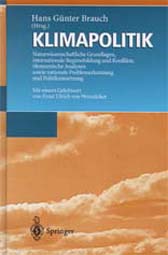 |
Hans
Günter Brauch (Ed.):
Klimapolitik.
Naturwissenschaftliche Grundlagen,
internationale Regimebildung und Konflikte,
ökonomische Analysen sowie
nationale Problemerkennung und Politikimplementation
[Climate
Policy.
Scientific Foundations, international Regime
Formation
and Conflicts, Economic Analyses as well as
National Problem Recognition and Policy Implementation]
Springer 1996, ISBN 3-540-60513-4,
€ 58.83
On
Contents
|
|
The book
is organised in 7 parts and contains 25 chapters. It is introduced
with a preface by Ernst Ulrich von Weizsäcker, the first
president of the Wuppertal Institute on Environment - Climate
and Energy. In the appendix it includes the texts of the Framework
Convention on Climate Change and of the Berlin mandate, a
comprehensive list of addresses on climate policy, a glossary,
a comprehensive list of literature, biographies of the editor
and authors and a detailed index including persons and subjects.
After
an introduction by the editor, part I on scientific foundations:
causes of global warming includes three chapters by Christian-Dietrich
Schönwiese and by Manfred Stock on climate impact research
possible consequences of climate change in Europe. In part
II on the developments from the ozone to the climate regime
in three chapters Thomas Gehring, Hermann Ott and Cornelia
Quennet-Thielen analyse the international negotiations on
both regimes from the beginning until 1995. In part III on
international climate policy: actors, conflict lines and problems
in five chapters by political scientists Andrea Lenschow analyses
the environmental decision making process in the European
Union, Sylvia Schumer reviews the role of the European Union
as an actor in international environment policy, Helmut Breitmeier
deals with climate change and justice between North and South,
Hilmar Schmidt analyses climate policy conflicts while Detlef
F. Sprinz discusses climate policy and environmental security.
In part IV three chapters by Meinrad Rohner, Ottmar Edenhofer,
Peter Hennicke and Rainer Walz provide economic analyses on
climate change. In part V three chapters by Udo Kords, Monika
Ganseforth and Liesel Hartenstein review the activities of
the two enquête commissions of the German parliament
on the protection of the Earth's atmosphere.
In part
VI seven chapters focus on different aspects of the implementation
of the Framework Convention on Climate Change on the level
of the Federal government, the state of Hess, and in the cities
of Frankfurt on Main, Heidelberg and Münster as well
as on the activities of the climate alliance and its local
and international activities in Frankfurt on Main written
by Franzjosef Schafhausen, Rupert von Plottnitz, Horst Meixner,
Beate Weber, Wilfried Bach, Werner Neumann and Lioba Rossbach
de Olmos. In part VII, the editor draws conceptual conclusions
on international climate policy, climate foreign and domestic
policy and offers conceptual considerations pertaining to
a new policy area.
|
